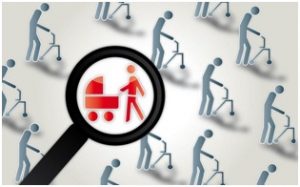Declining Birth Rates: Is the US in Danger of Running Out of People?

The impact of productivity growth swamps the impact of demographics in the US, as can be shown with simple arithmetic. The Social Security Trustees project that the ratio of people in the US between the ages of 20 and 65 to people over age 65 will fall to 2.8 by 2070. In its ‘high-cost’ scenario, which assumes both–lower birth rates and higher life expectancies, this ratio falls to 2.03, writes DEAN BAKER.
There have been several [article] pieces in recent weeks about the drop in birth rates in recent years. Birth rates declined in the recession and they have not recovered even as the economy has improved.
As these pieces point out, economics plays a big role in the drop in birth rates. Young adults often are having difficulty finding and keeping jobs that provide a decent wage. This was certainly true in the downturn, but it is still often the case even now with the unemployment rate at 50-year lows.
In addition, the United States badly lags other rich countries in providing support to new parents. We are the only wealthy country that does not guarantee workers some amount of paid parental leave or sick days.
While many companies offer these benefits, millions of new parents, especially those in lower paying jobs, cannot count on any paid leave.
Child care is also a huge problem for young parents. Quality care is often difficult to find and very expensive. This leaves many young parents, especially mothers, struggling to provide care for their children even as they hold down a job.
These are real and important policy concerns. People should be able to have children without undue hardship. We also want to make sure that children have decent life prospects. Having parents that are not overstressed and access to good quality child care are important for getting children on a good path in school and their subsequent careers and lives.
For these reasons, leave policy and child care need to be near the top of the policy agenda. However, the fact that people are having fewer kids is not a good rationale for supporting these policies. A stagnant or even declining population is not a public policy problem.
The pieces noting the prospect of a declining population usually treat it as self-evident that this is a bad development. It isn’t. The prospect of fewer traffic jams and less crowded parks and beaches does not sound especially scary.
There are some who see a declining population as a threat to the United States status as a world power. It’s not clear that this is especially true. If we focus on the economics of a stagnant or declining population the standard story is that we will have a smaller number of workers to support each retiree. This is true, other things equal, but also not an especially big deal.
First, the “other things equal” is a big qualification here because for the foreseeable future we are likely to be able to get as many working-age people we want from the rest of the world by relaxing immigration restrictions.
But even pulling out the impact of immigrants, the reality is that we have been seeing a fall in the ratio of workers to retirees pretty much forever. Life expectancies have been rising as people have better living standards and better health care. (Recent years have been an exception, where life expectancies have stagnated).
The impact of productivity growth swamps the impact of demographics, as can be shown with simple arithmetic. The Social Security Trustees project that the ratio of people between the ages of 20 and 65 to people over age 65 will fall to 2.8 by 2070. In its ‘high-cost’ scenario, which assumes both lower birth rates and higher life expectancies, this ratio falls to 2.03. Let’s take a more extreme case and assume it falls to 1.8.
One final point on this topic: ‘the robots will take all the jobs’ story is a scenario of massive increases in productivity growth. It is truly incredible; we can find stories of demographic collapse in the media, where we don’t have enough workers to change the bedpans for us old-timers.
While on the next [level], there will be stories of robots eliminating the need for workers in large, and growing, areas of the economy.
[Courtesy: https://www.counterpunch.org/2019/01/14/declining-birth-rates-is-the-us-in-danger-of-running-out-of-people/]


